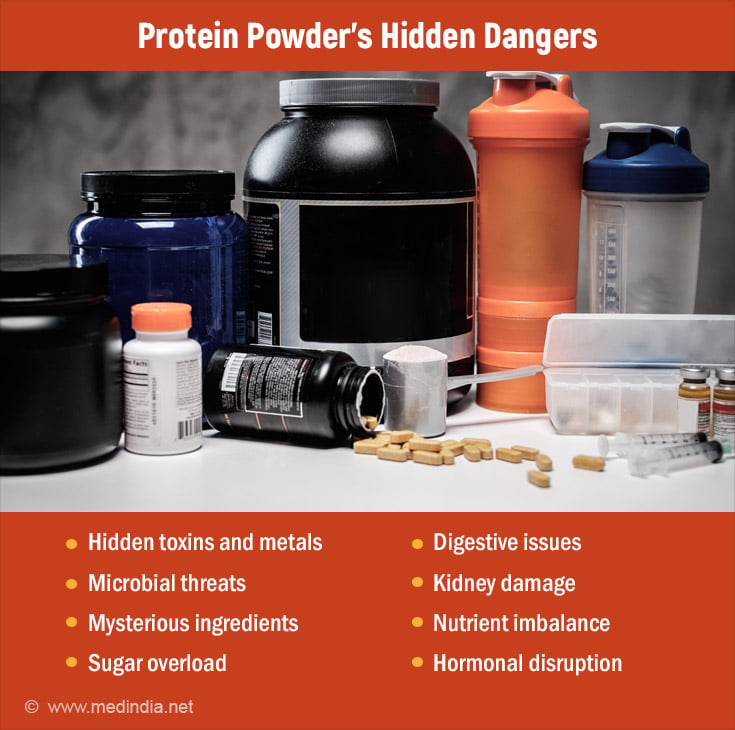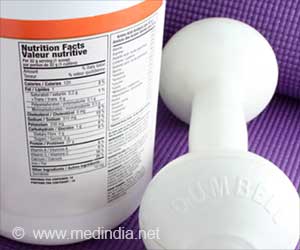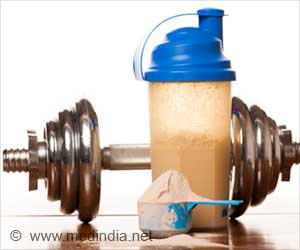- The Hidden Dangers of Protein Powders - (https://www.health.harvard.edu/staying-healthy/the-hidden-dangers-of-protein-powders)
About
Protein powder, a fitness industry staple, is widely consumed for muscle-building and athletic performance. While it can be a convenient source of protein, there are potential downsides to consider before you reach for that shaker bottle(1✔ ✔Trusted Source
The Hidden Dangers of Protein Powders
Go to source).
Did You Know?
Protein powders can contain heavy metals and harmful bacteria!Potential Risks of Protein Powder
1. Contaminants and Adulterants
Heavy Metals: Studies have found that some protein powders contain harmful levels of heavy metals such as lead, arsenic, cadmium, and mercury. These metals can accumulate in the body over time and lead to serious health issues, including organ damage, cognitive deficits, and developmental problems in children.
Microbial Contamination: Protein powders can also be contaminated with bacteria and other microorganisms. Poor manufacturing processes and inadequate storage conditions can lead to the presence of pathogens like Salmonella and E. coli, which can cause foodborne illnesses.
Adulterants: To cut costs or enhance the perceived effectiveness of their products, some manufacturers might add unauthorized substances, such as anabolic steroids or stimulants. These can pose significant health risks, especially for individuals with underlying health conditions.
2. Digestive Issues
Lactose Intolerance: Many protein powders, especially those derived from whey, contain lactose. For those who are lactose intolerant, consuming these powders can lead to digestive issues such as bloating, gas, diarrhea, and stomach cramps.
Artificial Sweeteners and Additives: To improve taste and texture, manufacturers often add artificial sweeteners, flavors, and thickening agents. These additives can cause digestive discomfort in some individuals, leading to symptoms like bloating, gas, and diarrhea.
3. Overconsumption Risks
Kidney Damage: High protein intake over prolonged periods can put a strain on the kidneys, especially in individuals with pre-existing kidney conditions. Excess protein needs to be filtered out by the kidneys, which can lead to increased workload and potential damage over time.
Nutrient Imbalance: Relying heavily on protein powder can lead to an imbalance in nutrient intake. It can crowd out other essential nutrients from whole foods, such as fiber, vitamins, and minerals, leading to deficiencies and associated health issues.
4. Hormonal Effects
Hormone Disruptors: Some protein powders contain phytoestrogens or other hormone-mimicking compounds that can disrupt the body's endocrine system. This can lead to hormonal imbalances, affecting everything from reproductive health to mood and energy levels.
5. Allergic Reactions
Allergens: Protein powders often contain ingredients that can trigger allergic reactions. Common allergens include dairy, soy, and nuts. Symptoms of allergic reactions can range from mild (rashes, itching) to severe (anaphylaxis), requiring immediate medical attention.
6. False Advertising and Mislabeling
Inaccurate Protein Content: Not all protein powders deliver the amount of protein they claim. Independent testing has revealed discrepancies between labeled and actual protein content in some products, leading consumers to believe they are getting more protein than they actually are.
Unverified Claims: Some protein powders come with health claims that are not backed by scientific evidence. These can mislead consumers into thinking the product offers benefits it does not, potentially leading to misuse and adverse health effects.

How to Get Protein Safely
Instead of relying on protein powders, aim to get your protein from whole foods like:
- Eggs
- Greek yogurt
- Nuts
- Seeds
- Low-fat dairy products
- Legumes
- Fish
- Poultry
- Lean meat
By following a balanced diet that includes these protein-rich foods, you can safely meet your daily protein needs without the risks associated with protein powders.
When to Consider Protein Powders
Registered dietitian Kathy McManus suggests that chemical-free protein powders may be helpful in certain cases with medical supervision, such as:
- Difficulty eating due to illness or old age or cancer
- Poor wound healing
- Needing extra calories and protein for recovery from burns or other serious conditions
In summary, Protein powders can pose health risks due to uncertain content, potential contamination, and added sugars and calories. In most cases, a healthy diet rich in whole foods is the best way to get the protein your body needs. If you have concerns about your protein intake, talk to a doctor or registered dietitian.










